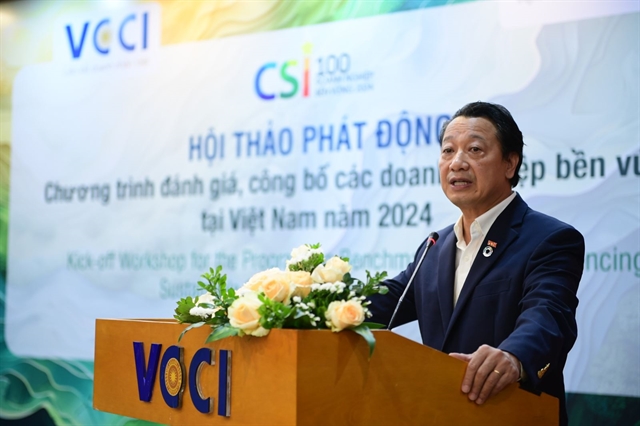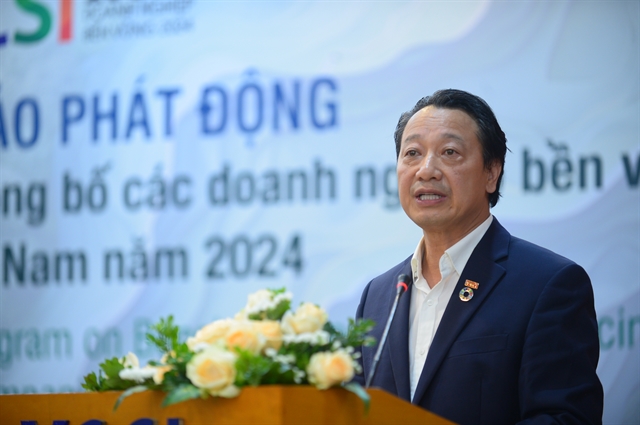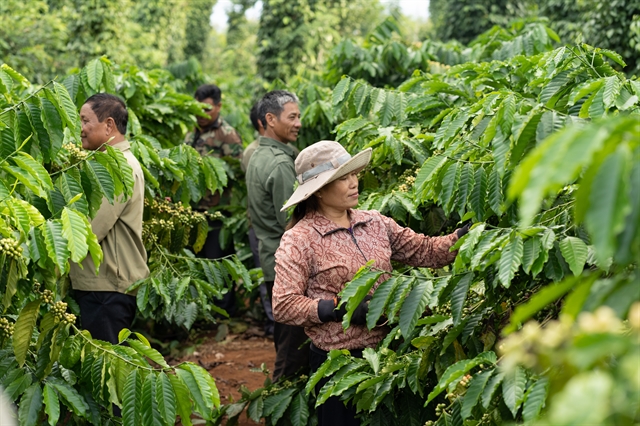 Economy
Economy

 |
| Nguyễn Quang Vinh is vice chairman of the Việt Nam Chamber of Commerce and Industry cum chairman of the Việt Nam Business Council for Sustainable Development (VBCSD-VCCI). |
The Việt Nam Chamber of Commerce and Industry (VCCI) has launched a programme for the Corporate Sustainability Index (CSI) in 2024 in Việt Nam to assess and praise business performance in three aspects -- economy, society and environment.
Nguyễn Quang Vinh, VCCI vice chairman and chairman of the Việt Nam Business Council for Sustainable Development, said that the annual meeting of the World Business Council for Sustainable Development (LD Meeting) in Montreux, Switzerland, at the end of April attracted a record number of attendees with more than 600 delegates from 45 countries and territories. This shows the growing interest in sustainable development, especially from the business community.
Vinh speaks to Việt Nam News reporter Vũ Hoa about this year’s CSI changes.
Could you tell us about the areas that the WBCSD will prioritise to drive its transformation in 2024?
As the world confronts increasingly unpredictable challenges, sustainable development emerges as the most viable path to secure the future we all aspire to.
During the LD Meeting, Peter Bakker, president of the WBCSD, highlighted several significant implications influencing sustainable development trends in 2024, including accountability, supply chains, nature, adaptability, social justice, and the role of AI in sustainable development.
Aligned with these impactful trends, the WBCSD will concentrate on implementing priority changes across several key areas.
First, it will target the reduction of carbon emissions, particularly within the industrial sector. Second, it will focus on natural resources, particularly in sectors heavily reliant on land resources such as agriculture and food production. Third, it will strive to promote fairness and equality. Fourth, it will push for the adoption of a climate-related Corporate Performance and Accountability System (CPAS). Fifth, it will enhance training and build capacity within enterprises to implement sustainable development initiatives.
Finally, it will foster partnerships in sustainable development to generate meaningful and lasting positive impacts.
 |
| More than 73.5 million high-yield, disease-resistant coffee saplings were provided to farmers under the NESCAFÉ Plan. Nestlé Việt Nam continued to lead the Top 10 most sustainable businesses (CSI) in Việt Nam in the manufacturing sector in 2023. Photo courtesy of Nestlé Việt Nam |
What specific initiatives does the Việt Nam Business Council for Sustainable Development (VBCSD-VCCI) plan to make to address these priorities?
First and foremost, the VBCSD will persist in implementing hallmark programmes such as the CSI and the Việt Nam Corporate Sustainability Forum (VCSF).
Through the CSI Programme, the VBCSD will maintain ongoing collaboration with esteemed experts to annually adjust and update the CSI. This serves not only as a metric to gauge businesses' sustainable development levels, but also as a tool to assist Vietnamese enterprises in practising sustainable corporate governance and accountability in a scientifically sound and resource-efficient manner.
Moreover, the VCSF will retain its position as the primary platform for dialogue on sustainable business development between the government and businesses, staying abreast of the latest global sustainable development trends to disseminate to the domestic business community.
In 2024, it plans to delve deeply into exploring strategies for achieving the net-zero goal in 2050, addressing issues such as nature conservation, decarbonisation, leadership development, fostering human capital in the era of AI, and sustainable development.
Furthermore, the VBCSD will actively advocate for the formation of working groups on green transformation including Environmental, Social and Governance (ESG) and green finance, fostering member growth and partnerships, alongside establishing the Sustainable Development Business Club (CSI 100 Club).
How will the CSI Programme adapt to better support businesses and align with global transformation trends?
One thing is certain: this year's CSI Programme will undergo significant changes to ensure more precise assessments, aiding businesses in synthesising, compiling statistics, and presenting information more clearly.
For instance, the classification of business profiles into three industry groups including manufacturing, trade-services, and mixed of manufacturing and trade-services will be tailored to reflect varying economic, environmental, and social considerations, and the scoring will vary accordingly to ensure fairness for each enterprise. For example, companies in manufacturing may have their environmental activities weighted more heavily compared to those in trade and services. Consequently, their performance in specific areas will be scored accordingly.
Moreover the CSI 2024 Index has revamped its approach to environmental indicators. Compliance indicators are now grouped as basic standards (C indicators), while innovative indicators that surpass regulatory requirements are classified as advanced (A indicators). This restructuring aids businesses in identifying priority areas and opportunities to add value, thus optimising production efficiency while bolstering environmental accountability. VNS
Corporate complianceThis year, the CSI has 153 indicators. Up to 62 per cent of indicators are related to legal compliance requirements, while 38 per cent are initiative-based.This is the ninth year in a row that the programme has been organised by the VCCI and the VBCSD in collaboration with the Ministry of Labour, Invalids and Social Affairs, the Ministry of Natural Resources and Environment, the Việt Nam General Confederation of Labour and the Central Economic Commission.Nearly 500 businesses joined last year's programme and up to 23 per cent were participating for the first time. Of them, 100 enterprises were recognised as the top sustainable businesses in Việt Nam in 2023.The exemplary businesses honoured in 2023 were those that had successfully implemented programmes related to sustainability and made great contributions to society for many consecutive years, including Nestlé Vietnam, AEON Vietnam, Vinamilk, Unilever Vietnam and Heineken.Among the top 10 sustainable enterprises in the fields of trade-services and production, foreign-invested enterprises accounted for 40 per cent and Vietnamese enterprises made up 60 per cent, of which 25 per cent were enterprises with a majority of State capital.Binu Jacob, Managing Director of Nestlé Vietnam, Co-Chair of VBCSD, emphasised that sustainability commitments needed to be accompanied by a clear roadmap and sufficient investments for that roadmap, innovation, transformation and cooperation at all levels to achieve successful sustainable development.He said CSI 100 had brought together businesses that pursue sustainable development by providing a clear picture of achievements, limitations to be addressed, and most importantly, the direction ahead.This year, the programme will welcome submissions from enterprises of all scales and industries through an online platform, with no associated fees for the candidates. Beyond the ranking and announcement of the top 100 sustainable companies, the CSI 2024 Programme also confers accolades to honour trailblazing companies in the development of the circular economy, reduction of carbon emissions, and those leading the charge in fostering diversity, equity, and inclusivity.Following the launch event, the committee will organise offline and online training courses on sustainable corporate governance in general and on how to apply the CSI Index to corporate governance, from June to August 2024.The deadline for submitting applications is August 16, 2024. For more information about the CSI 2024 Programme, please refer to the website vbcsd.vn/csi.asp. — VNS




